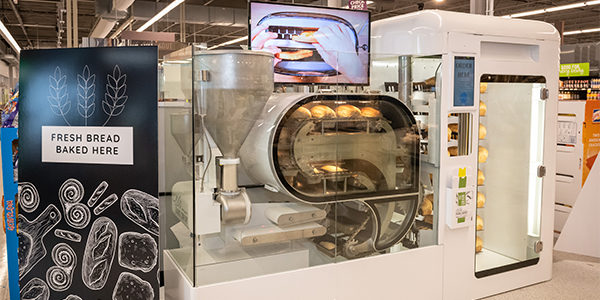Stop and slice

Ever since milkmen began delivering fresh cream to customers' doorsteps by horse-drawn wagons in the 19th century, perishable-food delivery has been one of the most challenging tasks in the supply chain. Now, a Northeast regional grocer is experimenting with a program that's aimed at reducing these spoilage-prone shipments.
Rather than shipping bread baked at a central facility to stores throughout the region, supermarket chain Stop & Shop is piloting an automated system that bakes loaves right inside the store. The grocer has installed a baking machine called "The Breadbot" at its Milford, Massachusetts, site, promising shoppers a constant supply of "sandwich-style bread that is fresh-from-the-oven, delicious, and affordable."
Formally known as "The Mini Bakery," the machine mixes, forms, proofs, bakes, and cools 10 loaves of $3.99-per-loaf artisan bread per hour, including varieties like white, wheat, whole wheat, nine grain, sourdough, and honey oat. The bread will be free of the artificial preservatives commonly found in on-shelf bread, since it will all be made and sold the same day, Quincy, Massachusetts-based Stop & Shop said.
"Making the bread locally, right in the store with The Mini Bakery, has a very positive environmental effect," Randall Wilkinson, CEO of the Breadbot's vendor, Washington-based Wilkinson Baking Co., said in a release. "The fleets of delivery trucks and the fuel they use are reduced, since only dry ingredients need to be shipped. And, because The Mini Bakery keeps track of its production, it's able to predict how much bread it should bake in order to meet demand."
Related Articles
Copyright ©2024. All Rights ReservedDesign, CMS, Hosting & Web Development :: ePublishing